
by Mia Taylor
Last updated: 7:00 AM ET, Sat November 25, 2023
The travel and tourism industry has been busy the past few years acknowledging and coming to terms with the worsening effects of climate change and the environmental destruction that’s being laid bare the world over. From dramatic biodiversity loss to the scourge of plastic pollution, the planet is grappling with a long list of daunting challenges.
Addressing these issues, as more than a few industry conversations have made clear, will take participation at every level—from the destination managers to the corporate offices of travel brands down to suppliers, transportation companies, and travel agents.
But there’s yet another key player in the industry who also has a vital role to play in advancing sustainable travel and the proactive protection of the planet, as well. And these individuals are on the front lines of travel every day: Tour guides.
Often overlooked in conversations surrounding the industry-wide transformation that needs to take place, tour guides are an essential part of realizing a better future.
“Tour guides, through their direct interactions with tourists, have the power to influence behaviors and shape the tourism experience,” says Brian Raffio, senior adventure travel consultant for the travel company Climbing Kilimanjaro. “By embracing their role as ambassadors and change-makers, they can contribute significantly to the shift towards a more sustainable and responsible tourism industry.”
Indeed, a tour guide’s actions, practices, and interactions with tourists can significantly impact the environmental, social, and economic well-being of a destination and ultimately the planet and its people.
The good news is that many travel stakeholders have already been thinking about the increasingly important role that tour guides play. Including the tour guides themselves.
TravelPulse talked with individuals from every level of travel and tourism about the role of tour guides as the industry attempts to shift toward more sustainable business models that will better protect nature, wildlife, and local communities for generations to come.
Here are outtakes from those conversations and tips from these same individuals about how tour guides can actively advance sustainability and environmental stewardship on a daily basis.
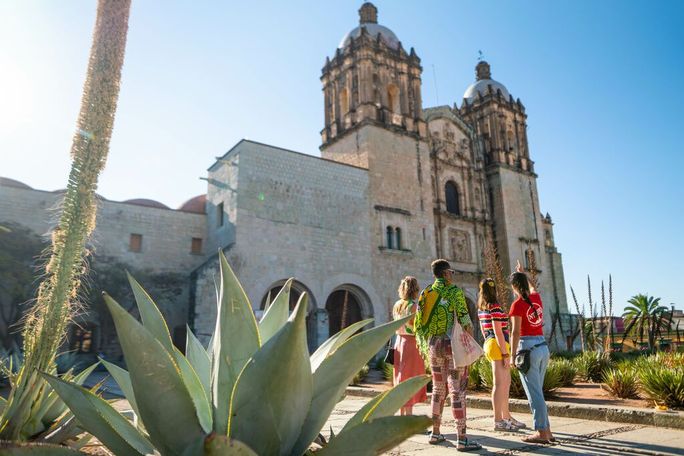
An Intrepid Travel tour guide and travelers in Oaxaca City, Mexico (Photo Credit: Courtesy Intrepid Travel. Photography by Ben McNamara)
Karla Zenteno, Intrepid Travel Tour Leader
A Mexico-based tour leader for Intrepid Travel, Karla Zenteno describes her role— and the role of every tour leader—as “frontline ambassador.” It’s only through leading by example that positive change can truly take place, she says.
“As a tour guide, we are the first face that our customers see and we are the first to cultivate the sustainable tourism philosophy,” she explains. “Our role in this matter is the base of the pyramid—we are the ones who take the people around the country and through good practices, we achieve a common goal: Creating a sustainable tourism culture.”
As she leads groups, Zenteno says she works to foster respectful tourism, an effort that includes ensuring minimum impact to local ecosystems and local cultures.
“When we work in tourism, we need to understand that we impact the local communities and environment in three main ways: economical, environmental, and sociocultural,” Zenteno adds.
Her tips for fellow tour guides wanting to be more proactive in advancing sustainable travel that protects both local cultures and the planet include:
- Encourage consumption of local, seasonal products: “This guarantees keeping the local culture, traditions, and ingredients of the local gastronomy, which goes hand in hand with protecting historical patrimony and generating jobs for the local people,” says Zenteno.
- Reduce electricity usage: This includes taking such steps as advising travelers to turn off air conditioners when they're out of their rooms and engaging in conscious use of this resource, as well as turning off lights.
- Educate about plastic pollution: “I have textile bags and a bottle that I refill and I take them all the time with me and show by example,” Zenteno says. “When I address this matter I highlight the impact to the wildlife on land and in the water from the garbage we generate.”
“We lead by example so if we want things to change for the good not only
of our destinations but the whole world, we need to take action,” says
Zenteno.
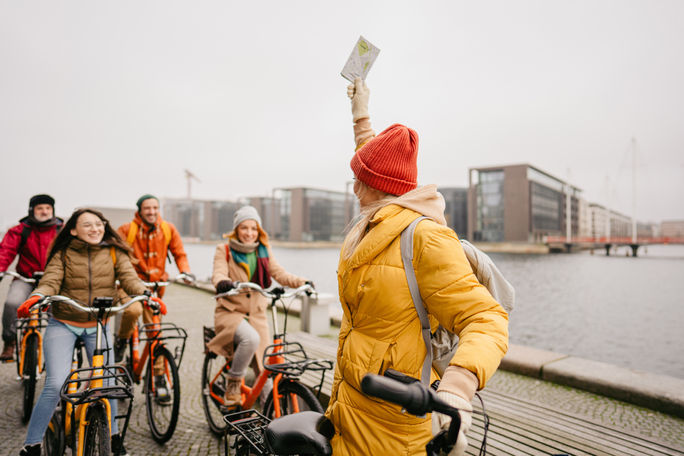
Tour guide giving directions to a small group of tourists (Photo Credit: Getty/AleksandarNakic)
Justin Francis, CEO, Responsible Travel
While all
tour guides have a role to play, guides from the local community in
particular are fundamental to the future of sustainable tourism, says
Justin Francis, CEO of Responsible Travel.
“We know tourism can be a
highly effective way to set aside land for nature or support protected
areas, but for it to be sustainable, local communities must benefit,”
begins Francis. “Local guides know the places to eat, places and
projects to visit that will most benefit the local economy, and at the
same time give you a greater understanding of your destination.”
In
other words, because local guides know a destination inside and out,
they can make it easier for visitors and tour companies to choose the
most responsible, sustainable options and activities.
"Local guides
also make it easier – and potentially safer - for travelers to choose
low-carbon transport options too,” continues Francis. “Things like
swapping out private transfers for public transport, domestic flights
for overnight trains, or choosing to explore by bike or on foot.”
Francis offers these tips to help tour guides actively advance sustainable travel on a daily basis:
- Offer
sustainable options: “Guides have a huge opportunity to educate
travelers and to make holidays more sustainable. Simple changes—like
taking guests to locally-owned restaurants serving seasonal,
locally-sourced produce instead of international chains and helping them
to use public transport can help lower carbon footprints and boost
income for local communities,” says Francis.
- Share sustainable
travel tips: Tour guides can also actively share tips and insights with
travelers at relevant points during their holiday. This might include
educating visitors about reef-friendly suncreams or why they shouldn’t
buy products that are made from coral. “The message is a lot more
powerful when you’re looking at a dying reef or seeing the decline of a
fish species through a local person’s eyes,” says Francis.
- Be the
eyes and ears on the ground: An equally critical role, a tour guide's "feedback
to tour managers on whether accommodations booked have any
carbon-reduction measures in place, whether there are huge amounts of food
waste at the buffet, or whether local communities could benefit more
fully from the trip is also vital in creating positive change,” says
Francis.
Paula Vlamings, Chief Impact Officer, Tourism Cares
Like
so many other thought leaders in the industry, Paula Vlamings, of the
global non-profit Tourism Cares, says that because of their direct
communication with visitors, tour guides represent an invaluable
opportunity to advance sustainable practices.
To begin
with, tour guides can help visitors better understand a destination and
its offerings, along with its laws, rules, regulations, and other
expected behaviors, says Vlamings. Additionally, she says tour guides
can lead the way as stewards protecting and preserving the environment
from tourism’s negative impacts.
“A tour guide’s role can be
two-fold—that of a motivator to modify tourists’ responsible behavior and
impact on site, as well as serving as an environmental and cultural
interpreter,” says Vlamings. “For tourism to be sustainable, travel
businesses must foster an understanding and appreciation of
environmental issues to facilitate responsible behavior for the long
term.”
Vlamings' additional tips for tour guides' daily actions include:
- Set
and maintain boundaries: “When guests go beyond the stated
boundaries to get closer to an animal for a photo opp or ask to drive
off-road to chase, feed, or touch any wildlife or choose to further
pollute oceans by using single-use plastic water bottles, it is the tour
guide who can and should set the example to follow the rules and best
practices,” says Vlamings.
- Serve as role models for more than
just travelers: "When tour guides follow park rules and regulations,
waste management best practices, cultural integrity, and responsible
interactions with nature, they set the standard for not only their
guests but also their community to make tourism more sustainable for
all stakeholders,” says Vlamings.
And one more tip, perhaps not for the tour guides themselves, but for the companies employing them: Training is critical.
“It
is very important for travel companies to regularly train tour guides,
as they can directly educate visitors about their impact on wildlife,
the environment, and the local communities,” adds Vlamings.”That training
should include how to handle guest pressure and make sure there is no
financial incentive for bad behavior.”
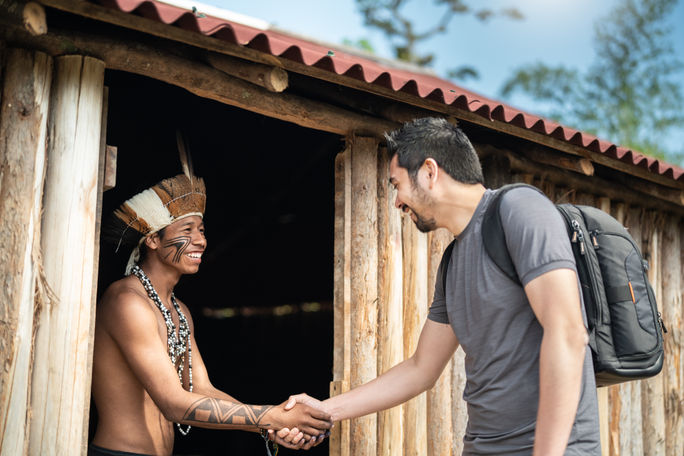
Tourist interacting with indigenous Brazilian young man. (Photo Credit: Getty/FG Trade)
Timothy Knight, Global Purpose Specialist, G Adventures
At
G Adventures, sustainability efforts take many forms. That includes a
primary focus on people, economics, and resources, as well as addressing
the environment, pollution, and waste reduction, says Timothy Knight,
the company’s global purpose specialist, and a former tour guide himself.
And
here’s where tour guides come into play for G Adventures: “On-trip
personnel have a huge role—they’re the ones that are actually on the
ground in the places we send our clients,” says Knight. “They see
first-hand how tourism impacts a destination, and are in tune with the
local communities that rely on and are impacted by travel.”
Given their critical role, G Adventures tour guides are also permitted a great deal of “agency,” adds Knight,
with regard to what travelers see and do during trips, which includes
defining how travelers visit a place, where they go, what activities
they participate in, and even who they purchase meals lodging and
souvenirs from. It’s up to G Adventures tour guides to ensure that all of
those decisions are made and carried out in a way that prioritizes all
sustainability concerns.
Here are Knight’s additional tips for tour guides:
- Tell
the whole story: “I think the natural inclination for a lot of guides–
and I’m sure this often at the direction of the tour operator –is to
paint to paint a pretty picture for the travelers in their charge,” says
Knight. “But showcasing only the parts of a place that don’t challenge
people’s conceptions or make them think about real-world circumstances
of local people, is a disservice to both the destination and the
traveler.”
If travelers aren’t aware of the impact that they have on a
place—both positive and negative –and don’t think about the ways their
visit has consequences for the environment and the people who live
there, then nothing changes.
- Meet the locals: Trip guides have
more power than anyone on the planet to introduce travelers to people
they would never have the opportunity to meet on their own. “Tour guides
translate. They help travelers understand cultural nuances. They help
travelers make meaningful connections and create powerful memories,”
says Knight. “The best thing we can do to build support for sustainable
travel and tourism practices is to help consumers understand and
identify with the people impacted by their travel decisions, and tour
leaders should go out of their way to create those opportunities
wherever possible”
Gustavo Timo, Vice President, Growth & Product, Adventure Travel Trade Association (ATTA)
Here’s
a statistic that truly illuminates why tour guides are so incredibly
critical to the future of sustainable tourism. According to a 2022 study
published by ATTA and Tomorrow’s Air, 67 percent of 752 travelers
surveyed said they share their climate awareness with others. In other words, travelers are “vectors of inspiration and
information for those around them,” says ATTA.
“Tour
guides are perfectly positioned to engage travelers in experiences that
open their minds and inspire them to act responsibly in their
destinations and when returning home,” says Gustavo Timo, vice president of growth and product for ATTA.
ATTA and its
tour guides follow the Sustainability Standards for the tour operator industry, which are designed to serve as a
global framework. That framework includes various actions tour guides
can take, such as:
- Maximizing local economic benefits: This
includes supporting local businesses and opportunities for trip
participants to purchase local goods and services. And can also include
providing information about how travelers might support local social
development or conservation projects.
- Guiding travelers regarding
waste and disposal: This step includes helping travelers to
avoid single-use water and disposable items and informing them about
appropriate disposal of waste—as well as picking up any waste found
during travels.
- Sharing impartial information: ATTA guides work
to provide accurate and impartial information about local nature and
cultures and respect the local narratives.
“By
including stewardship and responsibility…[tour guides] model and showcase
individual and collective efforts as an integrated part of the traveler
experience,” says Timo. “Travelers may not retain 100 percent of what is
learned, but if one person takes one positive action from their
experience and integrates it into their lives at home, that is a net
positive and something every guide can strive to achieve."
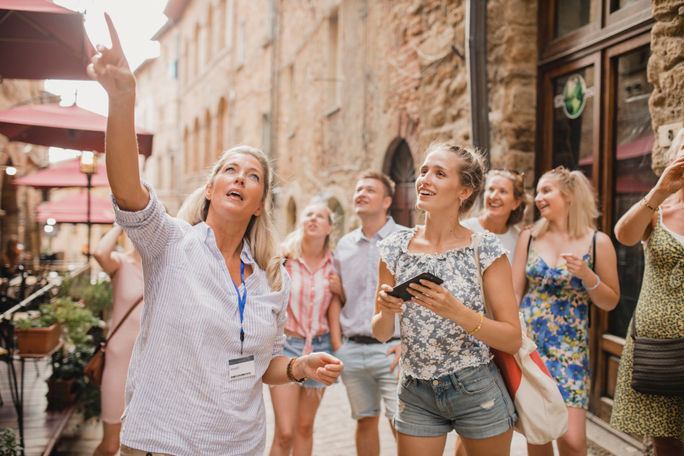
(Photo Credit: Getty / SolStock)
Dan Moore, COO, The Adventure Hub
Not only is Dan Moore the chief operating officer for a family of five adventure travel companies that are part of The Adventure Hub and a member of the governance board for the Adventure Travel Guide Standard, but for the last eight years he has also run his own consulting company—Pandion Consulting & Facilitation. In all of these capacities he has help shape the role of travel guides in the industry, but at Pandion in particular he has designed and delivered numerous guide training courses around the world.
Like other industry leaders, Moore's emphasizes that because guides are on the front lines of tourism, directly interacting with the guests throughout a tour experience, their role in illuminating and expanding sustainable travel behaviors couldn't be more critical.
"Guides need to have the ability to deliver authentic and meaningful information about sustainability, lifestyle choices, and environmental and social issues facing the area of travel—and the globe," begins Moore.
At his travel and tour companies that includes such examples as tour guides serving food on trips family style, which not only helps ensure there is less likely to be food waste, but also helps model such sustainable approaches for trip participants. In addition, guides are encouraged to take any unserved food home after a tour to further eliminate waste.
"The guide is not on a soap box, and instead inspires by example," adds Moore. "When I’ve guided these trips, the guests are genuinely excited to learn about all our practices, and it provides inspiration that they can do the same back home."
Here are his additional tips for tour guides seeking to lead by example:
- Model sustainable behavior: "Guests observe and take cues from the guide throughout the tour," says Moore. "A simple act of picking up trash off the trail, without making a deal out of it, sends a message to a guest."
- Demonstrate proper behavior when viewing wildlife: This includes crouching down, talking quietly, moving to the side of the trail, all of which offers a subtle way for guests to learn an important skill of responsible wildlife viewing.
- Inspire transference: "The key aspect, and arguably the most difficult to both do and measure, is to inspire the guest to take the message home and apply it in their life," says Moore. "For example, we use all reusable water bottles on our trip and make a point to highlight how terrible plastic is to the environment. There are ways to do this without shaming people who buy bottled water, but at the same time give them tools for how to do it back home."
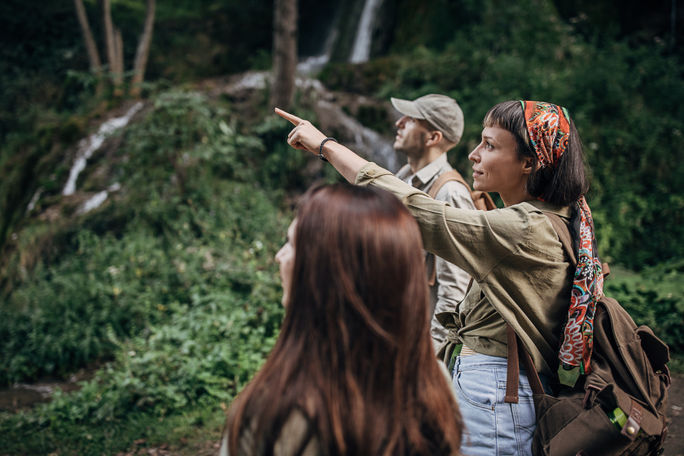
Travelers and tour guide in nature (Photo Credit: Getty/ South_agency)
Jake Haupert, Co-Founder, Transformational Travel Council
Perhaps
of all the people we spoke with, Jake Haupert offers the most unique
approach to helping tour guides embrace their role as stewards of the
future.
Haupert’s Transformational Travel Council (TTC) has just
launched its ‘Transcend 2050 Initiative.’ The primary objective of the initiative, which involves a series of engagements (virtual and in person), is to foster a higher level of awareness and understanding through transformation of the travel and tourism industry.
“This initiative
aims to use the power of travel to elevate the collective consciousness,
thereby transforming the sector into a conduit for positive global
change and deeper insight,” explains Haupert.
Alreadu, TTC is busy
training travel advisors, destinations, hoteliers, and guides about how to
enter what he calls “the transformation economy” and adopt a new
“transformative experience strategy.” The training is meant to inspire
personal transformations among participants and deepen their
relationship with nature.
“The result of this is an individual who
is no longer ‘othering’ nature and has become eco-conscious, become a
steward at home and on the road,” explains Haupert. “And it is the tour
guides on the ground, in the place, that have the opportunity to have
the most impact.”
When it comes to the role tour guides can play on a
daily basis moving forward to help better protect the planet and its
people, nature has a central role stresses Haupert. With that in mind, Haupert offers the following handful of tips for tour guides:
- Spend more intentional time in nature: Haupert suggests
tour guides seek out opportunities to listen, observe, and meditate in nature, as well as forest
bathing. Why? Because “this will build their relationship with nature,
which will help them better understand how to help their guests deepen
their relationship with nature.”
“People protect what they love, so
if you can help people reconnect or fall in love with nature for the
first time, that is where the real opportunity for advancing sustainable
practices arises,” adds Haupert. - Take travelers into remote and wild
places: Tour guides can help travelers find quiet, and have them use all
of their senses, thus deepening the travelers' connection with nature.
- Inspire
action: “Transformational travel is about action,” says Haupert. “So we
recommend that a good nature guide helps the guest to take action when
they get home, small and BIG Transformations that are symbolic of their
love and appreciation of nature. This will help them integrate new
behaviors and care harder for Mother Earth.”
Ultimately, a guide
that’s focused on helping travelers deepen their connection to nature,
needs to artfully and soulfully use techniques, methods, and tools that
meet the guests where they're at. “Otherwise, you might miss the
opportunity to help them connect in an intentional, meaningful, and
potentially transformative way,” says Haupert.
For the latest travel news, updates and deals, subscribe to the daily TravelPulse newsletter.
Topics From This Article to Explore